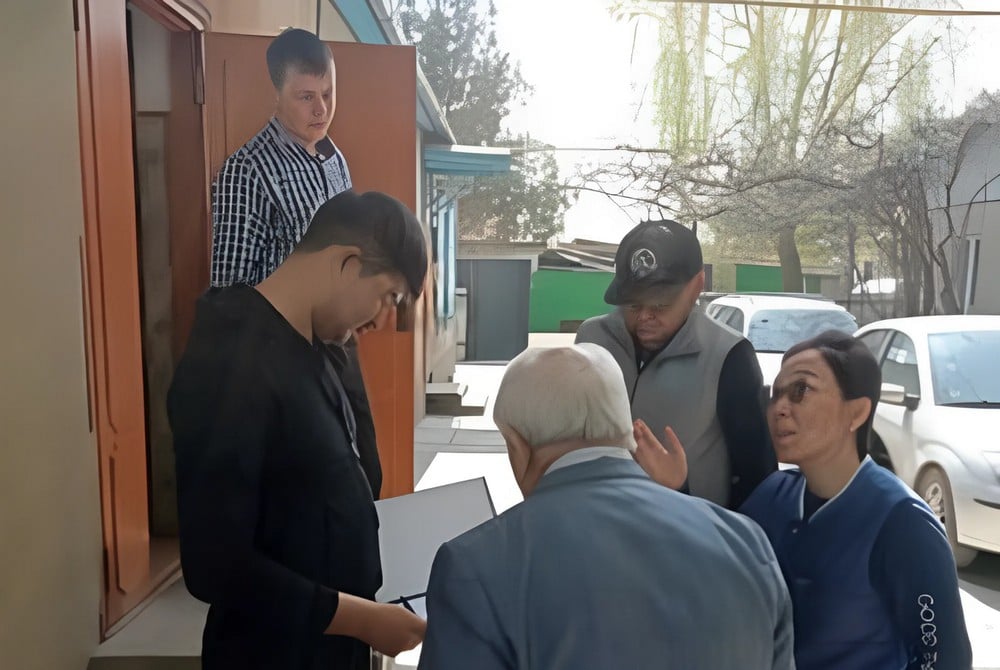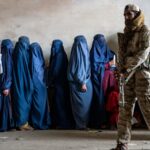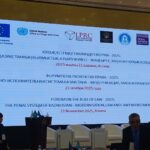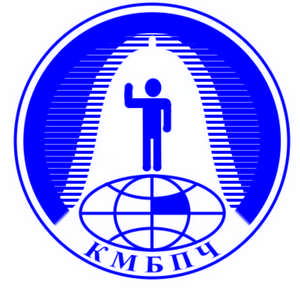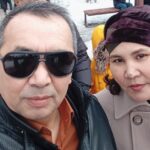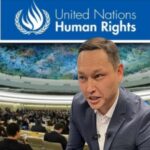Police in Shu District of southern Kazakhstan raided four meetings for worship of three unregistered Protestant communities and issued six summary fines in March and April. A local court handed down another fine. The leader of one church, 77-year-old Pastor Andrei Boiprav, awaits a court hearing, despite his health condition. Church members say the situation is causing “a threat to his life and health”. Forum 18 could not reach the police involved in the raids and fines. “The police are to blame,” says regional religious affairs official Saule Baibatshayeva.
In one District of southern Kazakhstan, Shu District close to the border with Kyrgyzstan, police in March and April conducted raids on four worship meetings of three local Protestant churches. Officers filmed those present, demanded that some write statements explaining why they were present and issued six summary fines. One of the church leaders was also fined in court and another, 77-year-old Pastor Andrei Boiprav, is awaiting a court hearing.
Members of the church Pastor Boiprav leads complain that the situation is causing “a threat to his life and health”, as well as to the rights of church members to continue exercising their freedom of religion or belief (see below).
The three churches subjected to police raids are all unregistered with the state. Two are of the Baptist Council of Churches, who choose not to seek state registration. Exercising freedom of religion or belief without state registration is illegal and punishable (see below).
Police summarily fined 47-year-old Pastor Valter Mirau of the Baptist church in the village of Konayeva and two other church members. Police also sent a case to court where Mirau was again fined for “illegal missionary activity”. Each of the fines handed to Mirau was the equivalent of two months’ average wages (see below).
Police summarily fined three members of the Baptist church in the village of Shu one month’s average wage each. Police also sent a case to court to punish 77-year-old Pastor Andrei Boiprav, despite his health condition (see below).
“What has been happening in the last month in Shu has aroused serious concern among Evangelical communities, which have experienced persecution for their religious activity,” local Council of Churches Baptists noted in late April. The Baptists’ activity “is not illegal or extremist”, church members insist.
Forum 18 was unable on 3 May to reach Shu District police or any of the officers involved in raiding the churches or issuing the fines (see below).
Saule Baibatshayeva, the official overseeing non-Muslim communities at the Religious Affairs Department of Zhambyl Regional Akimat [administration], says she knows about the raids and fines on Protestants in Shu District in March and April. “The police are to blame,” she told Forum 18. “They take their own measures under the Administrative Code. There was no order from us.” She claimed that she and her colleagues try to stop police from punishing unregistered Christian communities for meeting for worship (see below).
Shu District borders Kordai District, where officials have waged a campaign to punish Muslims from the Dungan ethnic minority who teach the Koran and Islam to local children without state permission. The District Court fined two more in 2023, bringing to 15 the number known to have been punished since 2018.
Meanwhile, the administrative case against a Protestant, Sergei Orlov, is due to resume in court in Almaty on 10 May. A Religious Affairs Department official Almaz Zhanamanov prepared the case to punish him for speaking in a flat in Almaty on 8 March to a group of church members who were meeting to mark international women’s day. Zhanamanov refused to explain why he was seeking to punish Orlov (see below).
Tight controls on exercising freedom of religion or belief
The regime imposes tight restrictions on the exercise of freedom of religion or belief. Against legally-binding international human rights obligations, the Religion Law allows only state-registered religious communities to hold meetings for worship which must be at state-approved locations. The Muslim community faces even tighter restrictions: only mosques subject to the state-controlled Muslim Board are allowed to exist.
All other meetings for worship risk punishment. Individuals, charities and companies face fines under Administrative Code Article 490, Part 1, Point 1 (“Violating the requirements of the Religion Law for conducting religious rites, ceremonies and/or meetings”) for holding meetings for worship without state permission or allowing such meetings to be held in their premises.
Under Religion Law Article 7-1, any religious community which wants to hold an event away from its own place of worship must get state permission for the event in advance. Officials insist this applies to prayer rooms. However, this means that only registered religious communities can seek such permission for prayer rooms, not individuals.
The regime is known to have brought at least 203 administrative prosecutions in 2023 – an average of 17 per month – to punish individuals and organisations for their exercise of freedom of religion or belief. Of these, 172 ended with convictions and punishments. Almost all of the punishments included fines of between several days’ and several months’ average wages.
Of the known administrative prosecutions in 2023, officials brought 25 (against 20 individuals, 4 companies, and 1 charity) for meeting for worship without state permission, hosting such meetings, or maintaining places for such meetings.
“The police are to blame”
Forum 18 was unable on 3 May to reach Shu District police or any of the officers involved in raiding the three churches or issuing the fines. The press service of Zhambyl Regional Police did not answer the phone each time Forum 18 called on 3 May.
Saule Baibatshayeva, the official overseeing non-Muslim communities at the Religious Affairs Department of Zhambyl Regional Akimat [administration], says she knows about the raids and fines on Protestants in Shu District in March and April. “The police are to blame,” she told Forum 18 from the regional capital Taraz on 2 May. “They take their own measures under the Administrative Code. There was no order from us.”
Baibatshayeva insisted that her Department “always defends believers”. “Those fined know me,” she added. “Our task is to defend them.” She was unable to say what she or her Department had done following the raids and fines.
Baibatshayeva said she and her colleagues visit local Districts regularly and tell police and local officials that, although Council of Churches Baptists do not register their communities with the state, “they shouldn’t touch them”. “Let them hold services in their own premises, only if they do something outside their territory will they be touched,” she said.
Konayeva: Raid, fines
On the morning of 3 March, police raided the home of 47-year-old Valter Mirau in the village of Konayeva in Shu District of the southern Zhambyl Region. Police arrived just before the Baptist church was due to begin its Sunday meeting for worship.
The Council of Churches Baptist congregation, which Mirau leads, meets each Sunday in a village home. It does not seek state registration.
Operational officer D. Umbet, Inspector Bekkali Dzhaksylykov and Local Inspector O. Sadyrbayev arrived at the church room. “They started to film the course of the meeting and the hall, going along the rows and filming the faces of all those present at the worship service,” the subsequent court decision notes. “They ignored the requests to stop filming and to explain their actions.”
Officer Umbet claimed that the police were checking “an anonymous call they had received with a request to check who was meeting at this address and what kind of meeting it was”. He questioned those present, including whether they met voluntarily or not, and demanded written statements.
Mirau wrote a statement explaining that church members meet voluntarily.
On 4 March, Police summoned Mirau and two other church members. Local Inspector Sadyrbayev drew up a record of an offence against all three.
Mirau was summarily punished under Administrative Code Article 489, Part 9. This punishes “Leadership of an unregistered, halted, or banned religious community or social organisation” with a fine of 100 MFIs. (Police are empowered to issue summary fines under this Article.) Sadyrbayev handed him a summary fine of 100 MFIs, 369,200 Tenge (about two months’ average wages).
On 5 and 6 March, Inspector Dzhaksylykov summarily punished the two other church members under Administrative Code Article 489, Part 10. This punishes “Participation in an unregistered, halted, or banned religious community or social organisation” with a fine of 50 MFIs. The fines were of 184,600 Tenge, 50 MFIs, each (about one month’s average wages) (halved if paid within 7 days).
All three reluctantly paid the fines, as if it is paid promptly the amount is reduced by half. However, they appealed against the summary fine to Shu District Court. On 5 April, Judge Zhibek Tazhibayeva rejected Mirau’s appeal, according to the decision seen by Forum 18. On 2 May, Judge Rashid Dosymkulov of Zhambyl Regional Court rejected his further appeal, according to the decision seen by Forum 18. Shu District Court similarly rejected the appeals by the other two church members, according to the court decisions.
On 5 March, police also drew up a record of an offence against Mirau under Administrative Code Article 490, Part 3. This punishes: “Carrying out missionary activity without state registration (or re-registration), as well as the use by missionaries of religious literature, information materials with religious content or religious items without a positive assessment from a religious studies expert analysis, and spreading the teachings of a religious group which is not registered in Kazakhstan”. The punishment is a fine of 100 MFIs, with deportation if the individual is a foreign citizen.
Prosecutor A. Seisebayeva presented the case to Shu District Court. On 27 March, Mirau told the court that the church meets in his home each Sunday at 10 am, “he does nothing against the law and did not violate the law,” the court decision – seen by Forum 18 – quotes him as declaring. “He asks for a just decision.” Judge Tazhibayeva found Mirau guilty and fined him 100 MFIs, 369,200 Tenge (about two months’ average wages).
Mirau appealed against the 27 March decision to Zhambyl Regional Court. However, on 30 April, Judge Rashid Dosymkulov rejected his appeal, according to the decision seen by Forum 18.
Shu: Visit during Sunday morning worship
Officials arrived at the Council of Churches Baptist congregation in the village of Shu in Zhambyl Region on 14 April as it met for worship in a home. The congregation – which is led by Pastor Andrei Boiprav – chooses not to seek state registration.
“Officials took photos and filmed us,” church members noted the same day.”They haven’t yet issued any fines, but they conducted explanatory work on the necessity of registering the church.”
Shu: Two Sunday morning raids on worship services
On the morning of 28 April, police returned to the Council of Churches Baptist congregation in the village of Shu as it met for Sunday worship. Immediately after raiding the church, officers raided another Protestant church in the village, the Children of God, as it met for Sunday worship.
Police arriving at the Council of Churches Baptist congregation claimed they had received a call from neighbours about the meeting for worship. “None of the neighbours had called, as became clear later after talking to the neighbours,” local Baptists noted.
“Two officers came into the prayer hall and listened to the whole of the first sermon, and half of the service,” church members said. “The others talked with church members.” Officers demanded that those present write statements indicating why they were present at the worship meeting.
One officer told church members that “we have nothing against you”, one church member told Forum 18 from Shu. “He almost apologised, saying the order had come from the religious affairs department.”
The following day, police handed summary fines to three church members who had written statements under Administrative Code Article 489, Part 10. This punishes “Participation in an unregistered, halted, or banned religious community or social organisation” with a fine of 50 MFIs. The fines were of 184,600 Tenge, 50 MFIs, each (about one month’s average wages) (halved if paid within 7 days).
Two of the three church members fined were brothers Mikhail and Andrei Boiprav (sons of the church leader), according to the records of an offence seen by Forum 18, both completed by police officer Inspector Saken Kurmanbekov. “I do not agree with the record of an offence because it contradicts the Religion Law,” Mikhail Boiprav noted on the record of his fine.
“Church members didn’t understand the reason for the fines and it wasn’t explained to them,” church members complained.
Inspector Kurmanbekov did not answer his phone each time Forum 18 called on 3 May.
On 30 April, police questioned the church’s leader, 77-year-old Pastor Andrei Boiprav, in the yard of his home in the village. “This was despite his unsatisfactory state of health, which is confirmed by the results of medical examinations and conclusions.” Church members complain that the situation is causing “a threat to his life and health”, as well as to the rights of church members to continue exercising their freedom of religion or belief.
Police prepared a record of an offence against Boiprav. “They accused him of illegal missionary activity even though the meeting was held in the prayer house and only members of the community were present.” He refused to sign the record of an offence.
The case does not appear to have yet reached Shu District Court.
Almaty: Prosecution for speaking to home meeting
A Protestant, Sergei Orlov, spoke in a flat in Almaty on 8 March to a group of church members who were meeting to mark international women’s day. He spoke of women in the Bible. He knew all of those present, except one man who filmed the meeting, he told Forum 18.
On 13 March, a woman reported the meeting to the police, asking for the church to be investigated. The police passed the information to the city’s Religious Affairs Department.
On 1 April, the Religious Affairs Department summoned Orlov. Almaz Zhanamanov drew up a record of an offence against him under Administrative Code Article 490, Part 3 (“Carrying out missionary activity without state registration (or re-registration), as well as the use by missionaries of religious literature, information materials with religious content or religious items without a positive assessment from a religious studies expert analysis, and spreading the teachings of a religious group which is not registered in Kazakhstan”).
Orlov insisted there was no reason for officials to bring a case against him.
Asked why he had drawn up the record of an offence, Zhanamanov refused to explain. “On all questions you should apply officially to the Department,” he told Forum 18 on 5 April.
Orlov tried to challenge the record of an offence. However, on 19 April, Judge Galiya Kasymova of Almaty Inter-District Specialised Administrative Court rejected his suit, according to the decision seen by Forum 18.
On 2 May, Judge Dinara Kuzetayeva at the same court began hearing the case against Orlov under Administrative Code Article 490, Part 3, according to court records. The case is due to continue on 10 May.
Credits: Forum 18: KAZAKHSTAN: One district, 4 police raids, 7 fines – 3 May 2024


